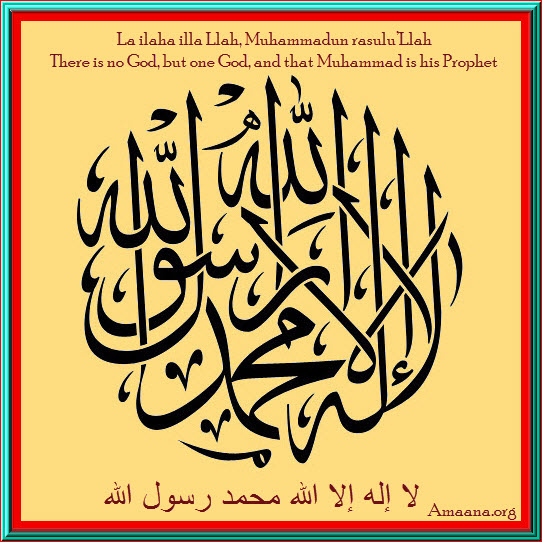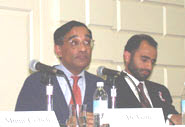
Understanding More about Islam
Harvard Graduate School of Education
October 4, 2001
by Marvin Pittman
“La ilaha illa Llah, Muhammadun rasulu’Llah”
“I witness that there is no God, but one God, and that Muhammad is his prophet.”
—The Shahada, Islam’s Declaration of Faith
As faith plays a strong role in America’s conscience in light of the events of September 11, the American public also focuses now on Islam. Even though an estimated 8-10 million Muslims—made up of people from a wide variety of ethnic backgrounds and national origins—take part in many avenues in American society, the American public at large remains greatly prejudiced against, misunderstanding, and ignorant of Islam.
On October 3, the Harvard Graduate School of Education explored the complex issues surrounding Islam in the panel discussion “Understanding More About Islam” at the Askwith Education Forum. Emerita Professor of Education Courtney B. Cazden moderated a conversation with Ali Asani, Harvard Professor in the Study of Religion and in Near Eastern Languages and Civilizations; Munir Fasheh, director of the Arab Education Forum at the Harvard Center for Middle-Eastern Studies; Hossam Jabri, head of the Interfaith Committee for the Islamic Society of Boston; Walid Fatahi, instructor of medicine at Harvard Medical School, endocrinologist at the Joslin Diabetes Clinic, and member of the board of trustees for the Islamic Society of Boston; and Mona Abo-Zena, Ed.M.’96, academic director of the Massachusetts Islamic schools Al Huda and Islamic Academy.

Classifying “The Other”
The panelists expounded upon issues of the misleading depictions of Islam in American society by discussing problems of classification as the Other. To Asani, Islam is not the Other, or an antithesis to the West, because Islam is not about being separate at all. “The message of Islam is universal…and is meant for the entire world.” In fact, the Arabic word islam means “Peace” and “Submission to the Will of God,” and the word muslim means “submitter.” “If you look at it this way,” Asani continued, “a Christian or a Jew is Muslim as well; any who submit to the one God is already Muslim.”
Continuing this line of thought, Asani stated, “Islam and the Qur’an have very strong roots in pluralism.” Muslims believe that Islam is the perfection of monotheistic faith, the final perfection of Judaism and Christianity. Muhammad, the founder of the Islamic faith and the messenger of the Holy Qur’an, the Scripture of Muslims, is the last of the great prophets—following in a line from the first man, Adam, and includes Abraham, Moses, David, Jesus. Islam maintains that all these prophets taught the same basic message of Islam, but that only through Muhammad was the Religion of God perfected. Muslims accentuate and affirm their relationship to Jews and Christians. Islam calls Jews and Christians “People of the Book,” and Muslims are obligated to protect their rights to practice their religions freely.
The Role of Women
To understand Muslims, one must first ask, “Who is Muslim?” Asani, a South Asian Muslim, explained, “[American] people think of ‘Muslim’ and ‘Arab’ as synonymous.” However, about 18% of the world’s Muslims live in the Arab world; the world’s largest Muslim community is in Indonesia; substantial parts of Asia and most of Africa are Muslim, while significant minorities are found in Russia and its former Soviet republics, China, North and South America, and Europe. U.S. Muslims in particular, according to Asani, are a special case. “In no other country is there this diversity of ethnicity, of interpretation, of culture. [U.S. Muslims] are at the leading edge of the Islamic world as to how to come to terms with plurality and diversity, an example to other countries.”
Yet Islam is still greatly misunderstood in mainstream American society, even by other proclaimed progressives. Mainstream U.S. feminism has often criticized Islam as a misogynistic religion. On the contrary, Abo-Zema, a Muslim woman, claims that the Qur’an is far more liberal than the Judeo-Christian Bible about women’s rights. While the Bible lays the fault of sin on Eve, in the Qur’an “Adam and Eve are both equally responsible; both sinned, both repented, and their repentance was received.” Historically, Abo-Zema claimed, Islam elevated the place of women, that “the birth of a girl is to be smiled upon just as the birth of a boy,” and that women and men are both “obliged to education.” Islam sees a woman, whether single or married, as an individual in her own right, with the right to own and dispose of her property and earnings. And, from the very beginnings of Islam, women have played a crucial role publicly as scholars of the Qur’an and as imams.
Distinguishing Faith from Politics
The distinction must also be made between the faith and “Islamic” governments. Regarding purportedly Islamic countries that oppress its female citizens, Abo-Zena said, “That is not Islam. Any place against [the equity of women] is not Islamic,” that “there is a difference between what Islam teaches about women and men, and what culture teaches,” and that “nothing prohibits women in Islam.” Regarding the hijab, the headscarf covering a woman’s hair and neck, veiling, and the draping quality of traditional Islamic female dress, some of such habits have little to do with Islam itself. Islam does require that both men and women dress in a way that is modest and dignified, but the traditions of female dress found in some Muslim countries are often the expression of local customs. Abo-Zema claims that those who look down on traditional Muslim dress as oppressive fail to look from a Muslim perspective—not an Other perspective, just a different one. Alluding to mainstream feminist theory of young girls’ self-esteem concerning weight, health and body issues, Abo-Zema said, “Our [Muslim] dress liberates us, taking attention away from us as sexualized female bodies and turning it to us as persons.”
The panelists agreed on a rethinking of Western and American modes of classification to understand Islam. Asani warned to not confuse Islam the faith with politics, and that such oppressive regimes do not represent Islam at all. “Exclusivists who use Islam as a political ideology are going against the pluralist center of the faith. They fundamentally contradict the core beliefs of the faith.”
Dispelling the Myths of Western Rhetoric
Western rhetoric often paints the picture that Islam promotes violence and terrorism. Jabri refuted this myth. “A jihad is not a ‘holy war’ like the Crusades. It means ‘struggle,’ a struggle for excellence or something good. The greatest jihad is the struggle against the self and temptation.” Islam condemns violence in any form, with no religious justification for the desperate acts of certain misguided Muslims, even in oppressed lands. According to Fatahi, to say that Islam promotes violence and terrorism due to the likes of Osama bin Laden is as erroneous as saying that Christianity promotes genocide due to the example of Hitler. The problem of terrorism, however, lies with context and interpretation. Fasheh says, “A fundamentalist in one place is different from a fundamentalist in another. Look at the human behind the categories.” “Each people need to police its own religion,” claims Fatahi, “but they need civilized ways to do it. In these oppressive regimes, there is no way to civilly express oneself.” But it must be remembered that ultimately, as Fasheh expressed, “Crimes are done by people, not by religions.”
The key to understanding more about Islam is to end depiction of Islam as the Other, a category that builds a wall. Fasheh said, “It is important to look at reality as reality, not as categories. [Look at] if people are righteous, just, loving, caring.” For Fasheh, this means combating the prejudice of “an image forced on people of the West versus Islam.” Watahi opened the evening with a call for sweeping away prejudice and learning true acceptance of others, and later, Fatahi seconded the call: “To be a good American is to be a good human being, to be a good Muslim is to be a good human being.”
Source: Harvard Graduate School of Education
- Islam: The Next American Religion
- Understanding the Quran — Diana Steigerwald
- Partners in Pluralism – Why the Aga Khan loves Canada
- The Tolerance of the Fatimids toward “The People of the Book” (Ahl Al-Kitab)
- Speech by His Highness the Aga Khan Upon Receiving the Gold Medal by the RAIC, Canada
- Aga Khan Receives Doctor of Sacred Letters Degree from Trinity College University of Toronto
Pingback: nouveau maillot psg pas cher
Pingback: vans-pas
Pingback: barcelone